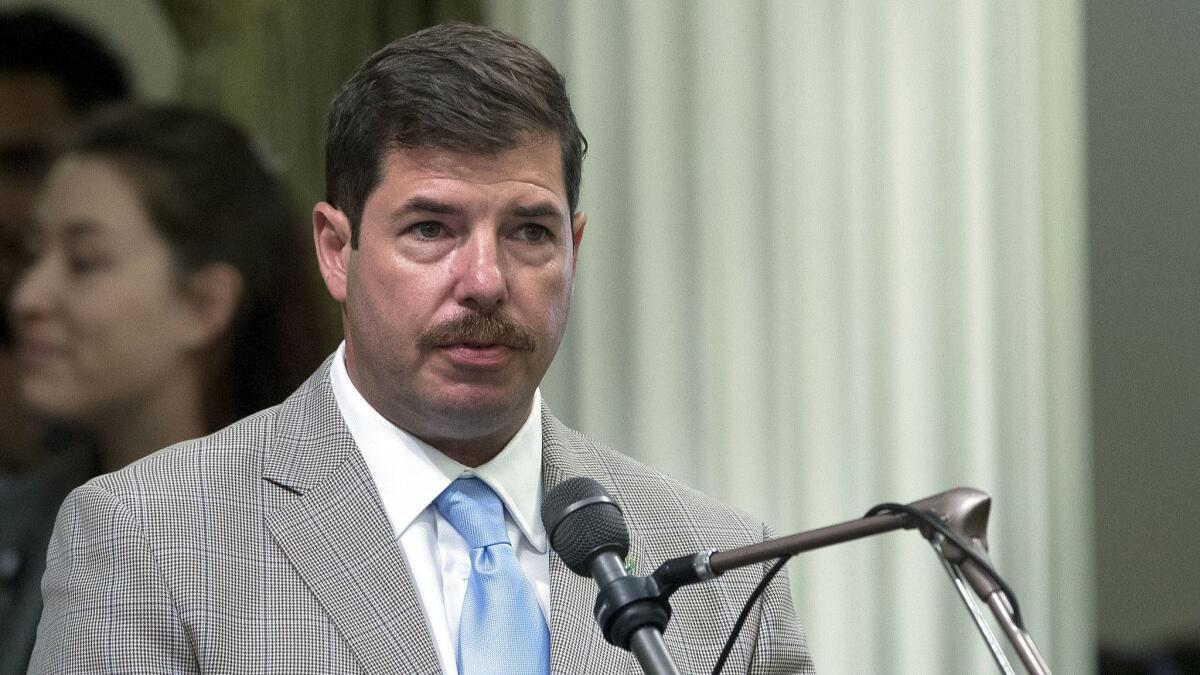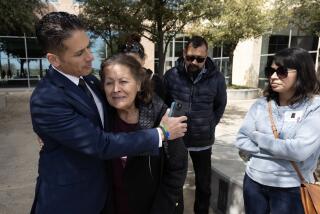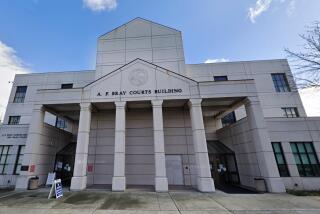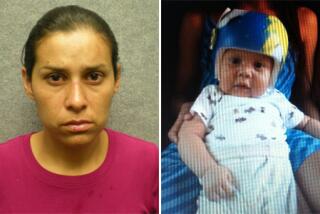Child cruelty case against California legislator begins in Fresno

During his short career in the California Assembly, Joaquin Arambula has worked to persuade Fresno voters to believe in him. Now the Democrat’s political fate could hinge on whether his legal team can convince a jury that his 7-year-old daughter didn’t tell authorities the truth.
In an unusual case that has dominated news in the Central Valley, the Democratic legislator is standing trial on a misdemeanor count of willful cruelty to a child after his daughter told police in December that Arambula struck her in the face. Photos showing a 1-inch bruise on the child’s right temple were shared with jurors this week.
The girl, at times clutching a stuffed animal, told a packed Fresno courtroom on the first day of the trial Friday that the assemblyman pinned her down on her bed and “grasped” her head, his ring hitting her by accident. She said she remembered telling authorities that he slapped her face, but now believes the appropriate word is “grasp.”
Fresno County Assistant Dist. Atty. Steven Wright told the jury that Arambula’s children have alleged a history of abuse at the hands of their father.
“You’ll hear the other instances of him being upset, losing his temper and committing other acts of violence against his children, such as squeezing, such as kicking, such as hitting, such as elbowing,” Wright said.
The 7-year-old girl later said on the stand that her father had also squeezed her to the point where she struggled to breathe.
Arambula, who maintains his innocence, has offered no explanation for his daughter’s bruised face. According to court records, the girl originally told her teacher that she fell when she was playing with her sister but later walked into the campus’ administrative office, asked for an ice pack for the bruise and said her dad slapped her on the face.
Arambula’s defense attorney said in opening statements that evidence would show inconsistencies in the girl’s statements and an inclination toward “fantastical details.”
“You will see that [Arambula’s daughter] has an answer for everything,” said Margarita Martinez-Baly, Arambula’s defense attorney. “Those are the kind of things we ask you to look at. Does it all make sense? Is she credible?”
Fresno police arrested the assemblyman Dec. 10 at his daughter’s elementary school after Child Protective Services reported that the girl said her father struck her on the face. In the four months since, Arambula and his attorneys have publicly sparred with the police chief and the county district attorney as the case unfolded.
Arambula defended himself in a round of interviews with reporters two days after police took him into custody. The politician and his defense attorneys have sought to cast Arambula as a devoted father who acted within his legal right to spank his child and as the victim of a politically motivated attack by local officials.
After Arambula’s media interviews, Police Chief Jerry Dyer publicly disputed the legislator’s account and told local news outlets that the girl’s injury was not consistent with a spanking.
When Fresno County Dist. Atty. Lisa Smittcamp filed the charge against Arambula in March, the assemblyman responded in a statement that said “politics may have motivated the decision” and called the allegation “false and unthinkable.” Arambula didn’t elaborate on the alleged political motivation.
Smittcamp, who typically refrains from commenting on open cases, disputed Arambula’s assertion in an interview with the Fresno Bee and said she based her decision on facts alone.
Arambula, a 41-year-old physician and member of a prominent Fresno political family, won a special election in 2016 to represent the western part of the city in the 31st Assembly District, a seat held by Democrats for more than a quarter of a century. He has headed a budget subcommittee on health and human services for the last three years. Some political supporters in Fresno have mentioned Arambula as someone who could eventually rise to become Assembly speaker like Cruz Bustamante, a former lieutenant governor who held Arambula’s seat in the 1990s, or run for Congress.
Arambula’s father, Juan, started his political career on the Fresno Unified School District Board of Trustees in the late 1980s before winning an election for county supervisor and later the same Assembly seat his son now holds. A Democrat often at odds with leadership, the senior Arambula famously renounced his party membership the year before he termed out of the lower house.
But the younger Arambula’s decision to blame local officials and evidence of the bruise have led some political observers to question whether the family’s time in politics could end with the misdemeanor trial.
Democratic legislators from the region declined interview requests about the case, and none has publicly come to Arambula’s defense. The sensitive nature of the case, involving a young child and a family, has made it a delicate subject across the political spectrum.
“You’ve seen cases of politicians in Fresno with DUIs, maybe even some accusations of spousal abuse, or bar fights,” said Thomas Holyoke, professor of political science at Cal State Fresno. “I can’t remember anything like this.”
Local politicians are already eyeing a run at Arambula’s seat, should the lawmaker be unable to return to his post in Sacramento. Arambula took a voluntary leave of absence from the Legislature in March, a move Assembly Speaker Anthony Rendon (D-Lakewood) said at the time he supported.
“If it turns out that [a jury finds] he genuinely hit his child, he’s probably politically dead at that point,” Holyoke said.
Arambula and his daughter tell two different versions of what took place in the family’s home on a Sunday evening when his wife was out of town.
In separate interviews, the girl told a social worker and a police officer that her father hit her on both sides of her face in her bedroom after she made her 6-year-old sister cry. She said his ring caused the bruise, according to court documents.
In a later conversation with a specialist trained to interview child witnesses, Arambula’s daughter said her father’s ring finger hit her twice, describing one of the blows as an accident after he slipped on a toy. According to court documents, the child also alleged that her father had kicked, squeezed and struck her in the past, and said her mother sometimes spanked her with a stick.
Two days after his arrest, Arambula told The Times that he spanked his daughter with his hand to discipline her for acting out. He denied that he hit the child’s face and said he saw no physical marks on her body.
“I’ve never hit someone in the face — man, woman or child,” Arambula said in December. “I’m literally struggling to figure out how to reconcile the situation that we’re in now.”
Spanking a child is generally legal under California law unless the act is considered excessive or unjustified. This week, attorneys for the prosecution and the defense grilled potential jurors about their beliefs on corporal punishment.
Arambula’s attorneys offered a more detailed version of the events in a motion filed with the court last week. The lawyers assert that he tripped on a toy on the floor that night as he entered a dimly lighted room shared by his daughters. He said his daughter jumped off the bed to get away from him and he caught her, turned her over and spanked her twice on her bottom.
The assemblyman has said his daughter was angry that evening and the next day when she went to school.
Defense attorneys say Arambula does not know how the injury to his daughter’s head occurred. The lawyers have focused their attention on what they say are inconsistencies in the child’s statements, saying the child is embellishing, making up stories and not a reliable witness.
“I think she’s a really smart kid and she wants her way,” Arambula attorney Martinez-Baly said in an interview Thursday. “She was angry that she was spanked. She was angry that she felt that her dad wouldn’t listen to her side of the story and they always side with” her sister.
Regardless of the trial’s outcome, political experts say the allegation alone has damaged Arambula’s political prospects, and future opponents could raise questions about Arambula’s decision to allow his attorney to cross-examine his daughter at trial.
“I think that’s definitely a line of attack in the future,” said Jeffrey Cummins, professor of political science at Cal State Fresno. “I think it does permanent damage to his reputation.”
Martinez-Baly acknowledged that Arambula is in a “no-win” situation. She said he feels strongly that he’s innocent and wants to clear his name.
“It’s going to be his word against hers,” she said. “I’m sure some people out there won’t like that and think he should have taken a deal to spare his daughter. It was his decision, and I can’t say I blame him. I would want to defend myself.”
Arambula’s three daughters were taken from his home by Child Protective Services the evening after the incident and were placed in the care of his parents for two days. After conducting an investigation, CPS allowed the girls to return home and closed the case in March, citing insufficient evidence of physical abuse, according to the defense.
Smittcamp, who declined an interview request, decided to charge Arambula with a misdemeanor. The prosecution has argued that striking a 7-year-old’s head hard enough to leave a mark is excessive and unreasonable.
John Myers, an expert on child abuse cases and a professor at McGeorge School of Law in Sacramento, said the decision to prosecute in such a case is uncommon.
“In a case like this where you don’t have very serious physical injuries, it would be more common for CPS to get involved and work with the family to help them, and for the D.A. to decline to press charges,” Myers said. But he noted that prosecutors and Child Protective Services have different roles in such cases; district attorneys focus on whether a crime has been committed, while CPS bases its decisions on whether a child would be in danger if allowed to remain in the home.
More stories from Taryn Luna »
Follow @tarynluna on Twitter.
More to Read
Get the L.A. Times Politics newsletter
Deeply reported insights into legislation, politics and policy from Sacramento, Washington and beyond. In your inbox three times per week.
You may occasionally receive promotional content from the Los Angeles Times.







